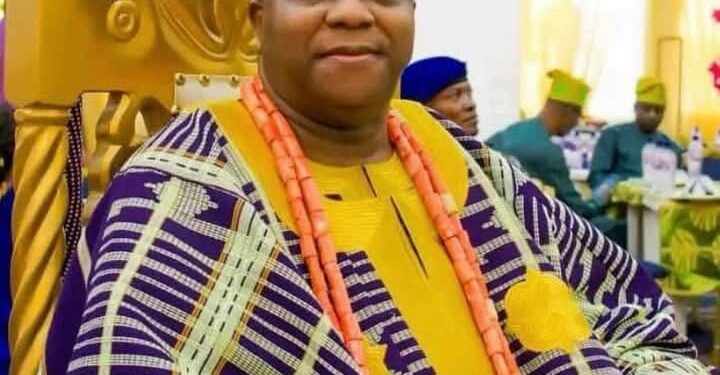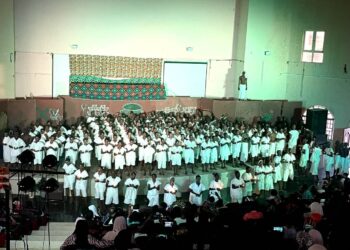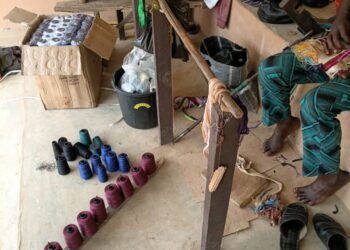‘Tunji Solomon
LIKE THE season of anomie, when history bleeds into royal mess, a lot is left to ponder. The scandal is more than a scandal: it is etched into recourse of regret and belated cry. It is worse when you allow your enemies to gloat over you, to revel in your fall and the lost of the coveted throne. The loss is more than tragic. Like The Pillars of the Earth (an adaptation of Ken Folliette’s timeless book), to fall at the peak is not only tragic, it is historic. Historians always remember such themes more than feats. The filth is not easily forgotten.

WITHIN THE corridor of power across the traditional settings of Yoruba race, a lot needs cleansing beyond the rites, rituals and shenanigans that have rotten the relics of their once enviable history. Their garbs and loins are no longer without impurities. From contest to territoriality, supremacy battle to contentious borderlines of official descriptions, there is nothing we have not seen in the last 10 years. Like a plague, rather than abate, it spreads like wild fire. The unofficial impunities.
THE BREAKING news that broke many hearts in silence across the Yorubaland early last week, shattered the heart of many Ipetumodu’s sons and daughters, home and abroad. It makes them lose their tongues in public discussion and discourse on socio-cultural stuffs, as Oba Joseph Oloyede, Apetumodu of Ipetumodu bagged jailed term. A traditional ruler whose involvement and indulgence in a classic multi-million Dollars Covid-19 financial fraud, would echo beyond the years ahead, offered him a 56 months jail seasons.
HE HOLDS a dual citizenship of being a Nigerian-American. None is able to free him from the self-affliction he brought upon himself, his lineage, his exit from the throne, and inglorious history. It is not a Nigerian context in which laws are potent against the poor and less-privileged. No one is above the law in foreign clime. A neutral place where justice lives.
AMONG THE charges against the traditional ruler were: conspiracy to commit wire fraud, three counts charges of engaging in monetary transactions in Criminally Derived Property, and subscription to False Tax Return. Beside his prison term, he is also offered sentence to three years of supervised release, coupled with mandated refund of $4,408,543.38 as restitution. It is simply an episode of odds.
SUCH IS the tragi-comedy of life. Many are seen as role models, sadly too, they equally need to be modelled by those beneath them. It is not only a sad narrative that history repeats itself in different ways because of human frailty and vulnerability. It is primarily due to human greed that usually consumes the appetite of its host. When greed consumes the greedy, it leaves no stoney unturned till its poison slowly ravages the life and time of the host. The narrative, like the familiar ones, is always tragic.
THERE WERE scores of historical kings who tasted imprisonment in their glory, among which was Richard II of England, who was imprisoned and supposedly murdered after his was deposed by Henry of Bolingbroke. In his own account lies his tragedy, the Louis XVI of France, was imprisoned by revolutionaries and famously executed, thereafter.
SIMILARLY, CHARLES I of England, was held by Parliamentarian forces before his execution, like David II of Scotland – who also enjoyed a spell in prison when he was captured as prisoner at Battle of Hallidon Hill. There are others of same fate across the globe. But they were not financially related. They were honourably and politically historic, not with the garb of infamy.
LIKE THE dirty deals known to be the trademarks of the drug lords and cartels, the current dispensation of royal souls in Yorubaland have a lot to learn from their forebears. They dine and wine with rogues – who sneeze filth, mud and stains in their daily chores. They think little of the position they occupy. Sadly, the throne, like other positions, occupies them. They exist, they don’t live.
THAT’S A tragedy of character that eventually nailed Oba Joseph Oloyede Apetumodu of Ipetumoduland’s shady grove to public ignominy. He walks in the corridor of quick-wealth, and he finds himself in the space of oddity. A slap on traditional title, fame and image. No Yoruba Oba should gloat over his misfortunes. It is his turn today, there are others like him in other palaces, who use the position of privilege and confidentiality to walk and dine with absurdity. They even work and walk against the interest of their own people. They are internal collaborators. Their loneliness in silence is occupied by other intricacies of life other mortals cannot be privileged to know.
WHILE THIS writer struggles with the alphabets as he composes this content, he is sad with the current development in relation to Apetumodu’s. Not because of the fall of the royalty, but what history has to offer in the years ahead. As this writer once wrote in 2008, a time would come Obas (Kings) would be decided by voting. The Oba-elect would be announced and indigenes would vote the best candidate. Not because traditional system has totally failed, because the system didn’t bring the best experience.
THERE ARE things many Indigenes know about each Oba that the king-makers don’t know. When such happens, nature takes it upon itself to abhor the imbalance, and cleanses its throne by its own purge. It has never gotten worse to this extent in Yoruba history, there was no precedent in that direction that a Yoruba Oba (king) was hurled into prison primarily because of financial gains enabled by lust, and grabbed in unethical ways. What history vomits was the historic seizure and exile of Yoruba traditional rulers and warlords, whose reigns were perforated with different unpleasant and inhumane dominance.
TRADITIONAL RULERS are individuals whose position entails the preservation of their kingdoms in all ramifications, against external aggression and aggressors. With benefits of insight, Oba Joseph Oloyede, Apetumodu of Ipetumodu, actually saw it coming. Like free fall, he was helpless. Helpless, the throne held him down, fame locked him inside himself, while fate delivered its own judgement. The rest becomes history.
LIKE EVERY tragic narrative, in which the tragic flaws lead inevitably to the exit or demise of a protagonist, like the last straw that brakes the camel’s back, the end justifies the means. The oracle cannot chose wrongly. Ifa knows the beginning and the end, the kingmakers know the present moment influenced by monetary value inducements, opportunities and promises. This writer cannot but ask: who chose for Ipetumoduland? Ifa oracle or the king-makers? Once again, the end justifies the means.
– Culled from:
The GUEST COLUMNISTS,
August 31, 2025
You can get every of our news as soon as they drop on WhatsApp ...To get all news updates, Join our WhatsApp Group (Click Here)












